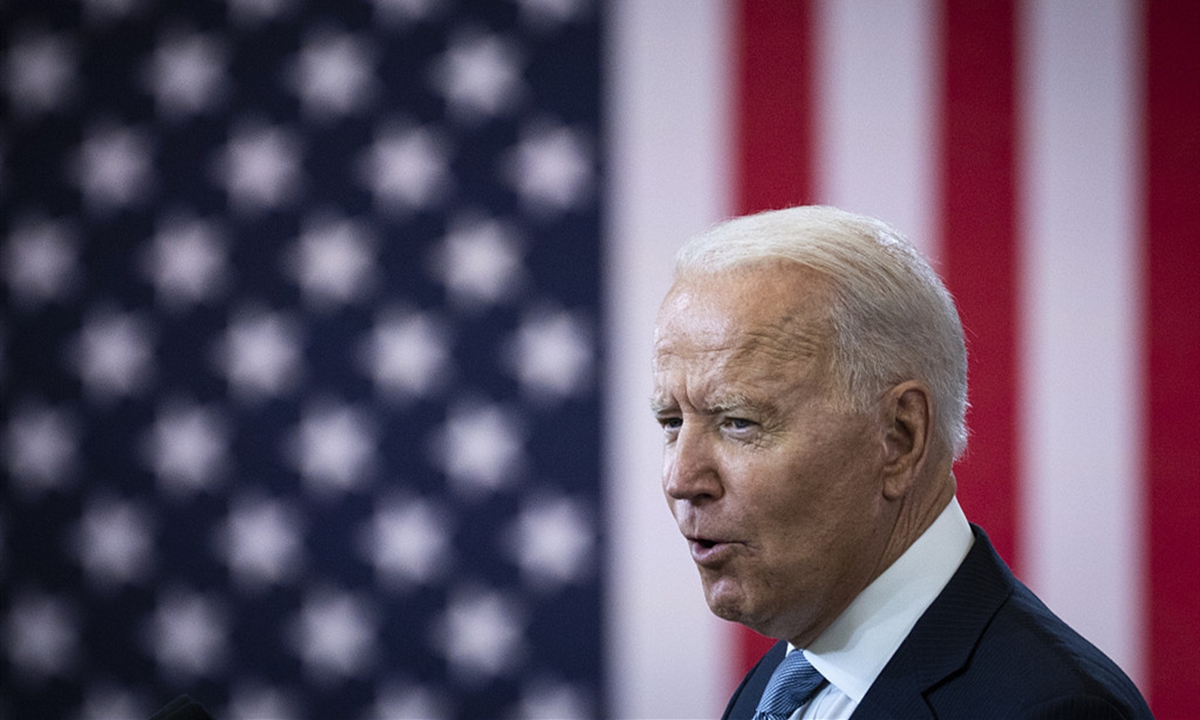
Biden Photo: VCG
US President Joe Biden on Tuesday announced that the Department of Energy will release 50 million barrels of oil from the Strategic Petroleum Reserve in an effort to help combat soaring gasoline prices and fears of inflation. This release will be taken in parallel with other major energy consuming nations including China, India, Japan, South Korea and the UK. At around $80 a barrel, crude oil is one of the main drivers of inflation around the world.The White House statement boasted of the US economic recovery. But everybody knows that the economy is the very thing the Biden team is least confident about. On releasing oil reserves, it is turning to China for help.
Inflation in the US is particularly serious. In addition to the impact of COVID-19, the Biden administration's massive federal spending program continues to stimulate money issuance, making it even harder to contain price increases. In fact, the US is trapped in a vicious cycle, in which Wall Street can't withstand the absence of economic stimulus and expansion, while ordinary people can't withstand economic stimulus and price expansion.
China is the largest oil importer and the second-largest oil consumer. If Washington can't get OPEC to produce more oil, it has to get China to release its reserves. Lower oil prices will do good to China, and it is believed that Beijing will not act in opposition to Washington on this issue. In fact, China recently signaled that it might use some of its oil reserves.
But it is important to note that inflation is far more serious in the US, and that it is having a political impact that seriously threatens the Democratic Party in next year's midterm elections. With so many voices calling the Biden administration "economically incompetent," some political analysts believe that inflation could be enough to ruin the Democratic Party in the midterm elections if prices stay high. As a result, the Biden administration will have to turn to China again. This is a direction that benefits everyone, but China clearly has the upper hand.
The case is the epitome of how the US and China have a lot of common economic interests and how much the US needs China's help to solve its problems. It simply will not work if the Biden administration continues the brutal "decoupling" strategy of the Trump era.
The Biden team already knows that high inflation in the US has something to do with its heavy tariffs on Chinese imports. Even with all these heavy tariffs, Chinese imports to the US have not decreased, reflecting the fact that Chinese goods are irreplaceable in meeting demands of US consumers. This dramatically increases the bargaining chips of Chinese companies in their battle with American importers over who will pay for those additional tariffs.
As the situation of the US economy gets tighter, the bargaining chip of Chinese companies will increase, and those tariffs will be hard to sustain for long. The Biden administration must hate them, but they are unwilling or afraid to give those tariffs up. They hope that China could make more concessions which will not only help them play the game with China, but also cater to public sentiment at home so as not to be accused of being "soft on China."
This is the result that China does its own things well. We always say that the interests of China and the US are highly intertwined and that we both have a stake in each other's economic growth. This is true. Acting against the rules, the US is bound to hurt itself. It recklessly attempted to "decouple" from China in order to make China feel uncomfortable. What is the result? The disruption in the US supply chain is much worse than in China, and China has not yet retaliated by attacking the US supply chain.
We hope the US could learn from its current stalemate. It should realize that the United States of America in the globalized era has no capital to act recklessly. The scale of China's manufacturing industry is larger than that of the US. Our total retail sales of consumer goods are expected to surpass those of the US in 2021. China's consumption of commodities has already surpassed that of the US. Theoretically, the US has basically lost the ability to impose economic sanctions on China. Cooperation and win-win will increasingly become the only choice for the US in terms of its economic policy toward China.
As China's nominal GDP is approaching that of the US and will eventually exceed it, what the US needs is not anger or jealousy, but sobriety and rationality. It needs to seriously mull over how to get along with China peacefully. China should continue to work hard to do its own things well while maintaining patience. In case of trouble, it might as well let the bullets fly for a while. China's strength in many cases will make some strategic provocateurs calm down.

